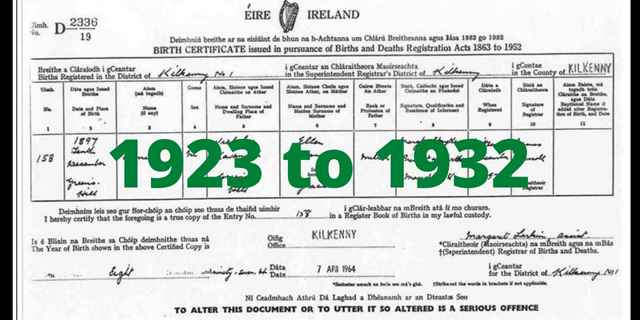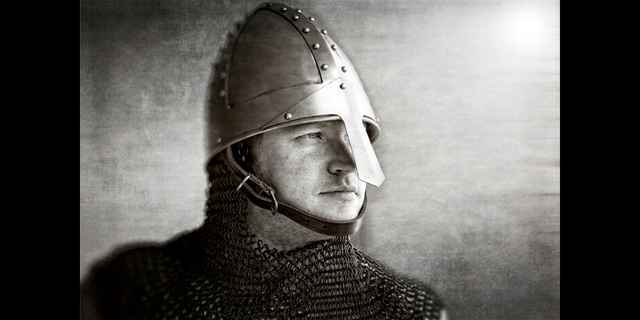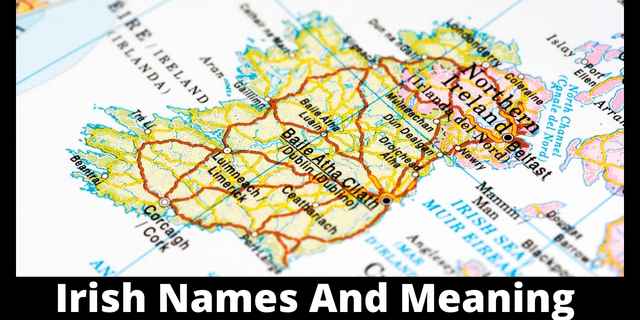Are you interested in learning the origin and meaning of an Irish last name that begins with I?
Here are the meanings of Irish surnames that had birth registrations in early 20th century Ireland.
We also explain the Norman and British influence on these names over centuries.
Summary Of Irish Last Names Beginning With I
If you’re interested in numbers, this table has some statistics to go with these names.
| Last Name | Births 1923-32 | 2010 U.S. Census |
| Igoe | 104 | 1,114 |
| Ireland | 22 | 14,800 |
| Ireton | 13 | 734 |
| Irish | 20 | 7,336 |
| Irvine | 28 | 9,397 |
| Irwin | 337 | 34,297 |
| Ivers | 68 | 2,205 |
| Ivors | 6 | Less than 100 |
Irish birth registrations from 1923 to 1932

I chose ten years starting in 1923 in order to restrict the birth locations to the Republic of Ireland. In other words, I wanted to exclude Northern Ireland.
This is only because when I took earlier dates, the number of English and Scottish names registered in districts like Belfast made the list too arduous for me to filter down to Irish origins.
Irish names in the U.S. census of 2010
You’ll see some numbers represented as “Under 100”.
The name could have had ninety-nine bearers in the census that year. But it also means that the name may not have appeared in the U.S. census at all in 2010.
Who Were The Normans And What Is “Anglicization”?
In the next section on the origins and meanings of these names, I’m going to mention Norman influences and Anglicization.
The use of surnames in Ireland dates back to the tenth century. Children adopted the first name of their father and prefixed it with “Mac” or “O”, which means “son” and “descendent of”.
These names were in the Gaelic language.
Anglo-Normans and Norman names

After William the Conqueror led the Norman Conquest of Britain, the Anglo-Normans spread to Ireland from 1169.
They introduced Norman names to the island that we now consider being very Irish. I’ve pointed out Norman origins in the next section.
The anglicization of Irish names
In later centuries when Ireland was under British rule, the use of the Gaelic language was curbed.
This led to the Irish making their names look and sound more English i.e. Anglicization.
The simplest way was to drop the O and Mac in front of a name.
Another way was to pick the nearest sounding English name.
Some of the names on this list may not seem very “Irish” to you. But they are prevalent in Ireland because they were phonetically similar to a Gaelic name.
The third way was to pick an English name that has the same meaning as the Gaelic name. The two names may sound completely different.
Origins And Meanings Of Irish Surnames Starting With I

Some of these names have different origins depending on the region. The name may be of English origins when found in England.
Igoe
This name is the anglicized form of Mac Iagó which means “son of Iago”.
Iago itself isn’t considered to be an old Irish name. There are several theories as to its appearance in Ireland.
One is that it is of Spanish origin and comes from the Spanish name for James.
Another is that it is of English origins and comes from the name Jacob.
Ireland, Irish
These two names, Ireland and Irish would have been conferred on Irish people who settled abroad.
One assumes that one or more descendants returned to the country and kept the name.
If you’re wondering about the origins of the country’s name, it comes from the old Irish word Éiru. You may be more familiar with the modern Irish word Éire.
Éiru was one of the Tuatha Dé Danann, a mythological set of creatures and deities. She was the goddess of Ireland.
The English name for the country simply comes from the words Éiru and “land”.
Ireton
This name is technically of English origin, but there’s a good reason to make it “half” Irish.
The name comes from the English words for Irish (Ire) and a settlement (tun). It describes a place where one or more Irish people settled.
Later English bearers of the name simply came from the town.
Irvine, Irwin, and Irwing
This is one of those names with different meanings and origins depending on the region.
In Ireland, it may simply be the Scottish name that comes from a town of that name in southwest Scotland.
But it can also be an anglicization of the Gaelic name Ó’hEireamhóin, which means “descendants of Eireamhón”.
In “Irish Names and Surnames”, Woulfe points to a Bishop of Kildare of that name in the eleventh century.

Ivers, Ivors
These Irish names ultimately have Norse origins.
It’s an anglicization of Ó’hÍomhar or Mac Íomhar. These mean the descendants or the son of Íomhar.
This personal name is the Gaelic form of the Norse name Ivarr.
Other Last Names In Ireland From 1923 To 1932
The surnames I’ve already gone through are Irish in origin or were brought into the country centuries ago.
But many other names had significant numbers in early twentieth-century Ireland. These are mostly of English or Scottish origins.
| Last Name | Births 1923-32 | 2010 U.S. Census | Origins |
| Impey | 1 | 182 | English |
| Inglis | 5 | 2,649 | Scottish |
| Ingram | 28 | 69,345 | English |
| Irving | 3 | 14,896 | Scottish |
| Isaacson | 9 | 7,668 | Jewish |
| Ives | 4 | 8,233 | English |
| Ivie | 8 | 4,411 | English |
| Ivory | 85 | 7,201 | English |
Sources
I used several sources to research origins and meanings. Sometimes these sources disagree with each other!
- Irish Civil Birth Registrations
- Irish Names and Surnames by Reverend Patrick Woulfe
- Dictionary of American Family Names by Patrick Hanks